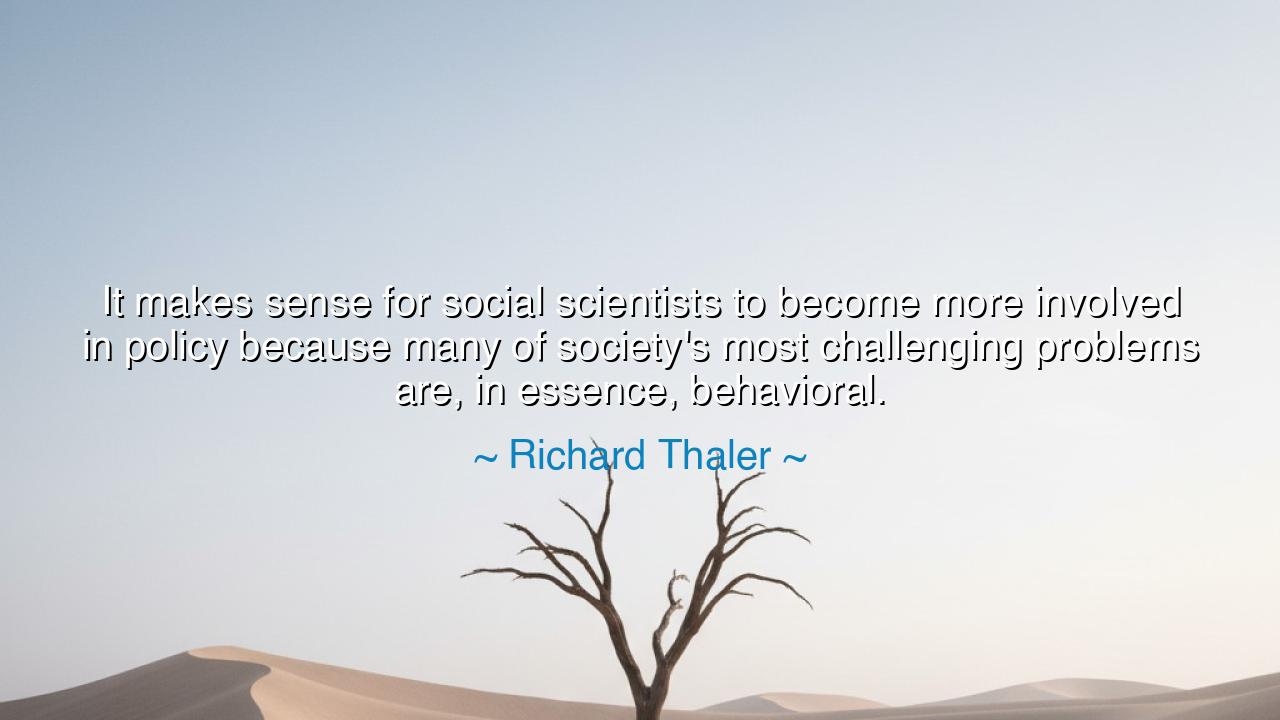
It makes sense for social scientists to become more involved in
It makes sense for social scientists to become more involved in policy because many of society's most challenging problems are, in essence, behavioral.






Hear now the wisdom of Richard Thaler, master of the study of human choice, who proclaimed: “It makes sense for social scientists to become more involved in policy because many of society’s most challenging problems are, in essence, behavioral.” In this declaration lies both insight and exhortation. For while kings and lawmakers have long written rules, and while economists have measured wealth, it is the unseen habits, fears, and desires of the human heart that often decide whether nations prosper or fail.
What Thaler reminds us is that society does not move upon numbers alone, but upon choices—the everyday decisions of millions of people. Why do citizens save too little, eat too much, or ignore their health? Why do they cling to prejudice, or fail to prepare for the storms of life? These are not merely matters of economics or law; they are behavioral matters, springing from the quirks and frailties of the human mind. Thus, he calls for social scientists, those who study behavior, to guide policy, for only when laws and systems reckon with real human nature can they bring lasting change.
Consider the story of ancient Rome’s grain doles. The emperors, seeking peace in the city, distributed bread to the people. But they did not account for behavioral incentives: laziness grew, dependency deepened, and the citizens became restless, demanding more and more. Rome learned that policy without understanding of human behavior is like building upon shifting sand: it may stand for a season, but soon it crumbles. The emperors sought to control the body, but they failed to understand the soul.
Or think of a more modern tale: in the 20th century, campaigns against smoking relied first on laws and warnings, but they faltered. It was only when behavioral insights were applied—graphic images, public bans, and social stigma—that the habit began to fall. This was not the triumph of numbers alone, but of understanding how people truly act, how they respond to fear, shame, and community pressure. Thus Thaler’s wisdom shines clear: to solve great problems, we must enlist not only rulers and economists, but also the social scientists who study the hidden patterns of choice.
What, then, does this say about us? That our greatest struggles—poverty, addiction, climate change, inequality—are not born only of circumstance, but of behavior. We waste, we procrastinate, we cling to the present and ignore the future. Laws alone cannot change this, nor can punishment alone. But guidance rooted in the knowledge of the mind can “nudge” people toward wiser paths. Here lies the strength of Thaler’s thought: that by uniting policy with the study of behavior, societies can heal their deepest wounds.
The lesson, O listeners, is twofold. First, let us not despise the insights of social science, for they are as vital to governance as armies and treasuries. Second, let us each reflect on our own behavior, for the problems of society are not distant storms, but patterns born of countless individual actions. If we desire change, we must be willing to change ourselves—to act with foresight, discipline, and compassion, even when our instincts push us otherwise.
In your own lives, therefore, seek to understand not only what you do, but why you do it. Question the impulses that drive you, and be mindful of the small daily choices that shape both your destiny and that of your nation. And in your communities, support policies that account for human nature, that guide people gently toward wisdom rather than demanding perfection.
Thus remember Thaler’s words: many of the hardest problems are behavioral. And so the path forward is not brute force, but insight. By uniting law with the science of behavior, by marrying reason with compassion, society may yet overcome its challenges and rise to greater harmony.






AAdministratorAdministrator
Welcome, honored guests. Please leave a comment, we will respond soon